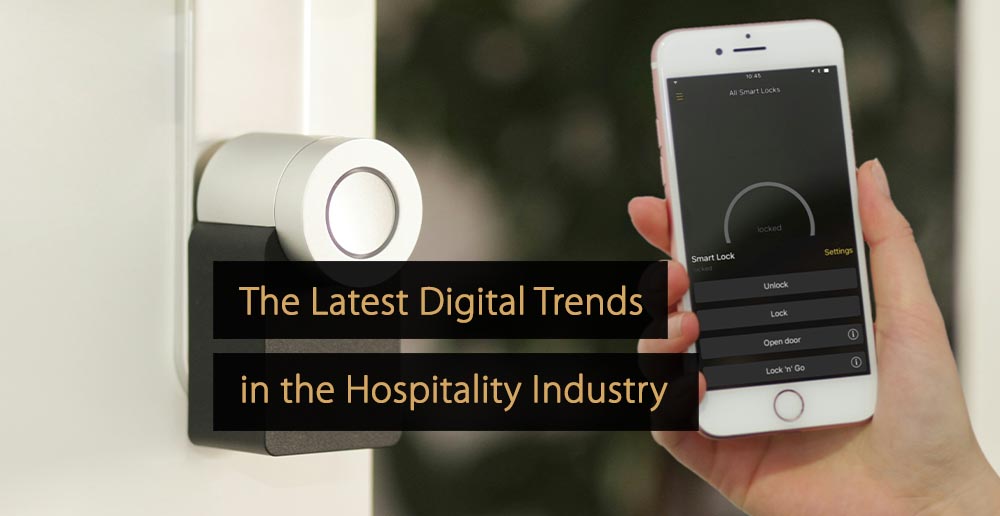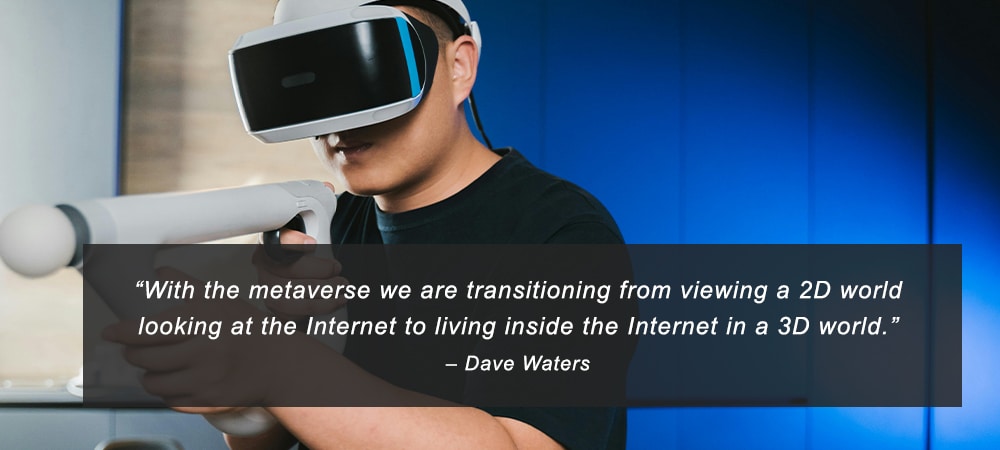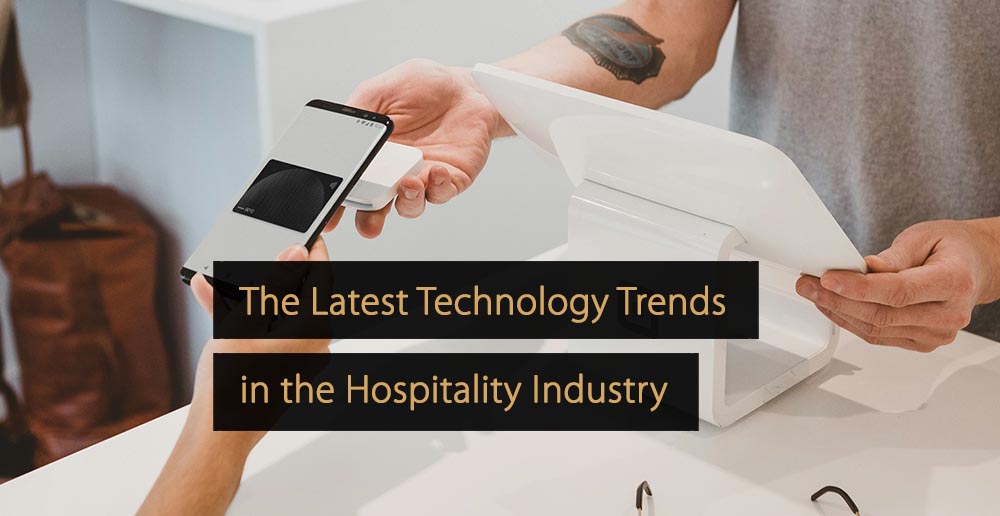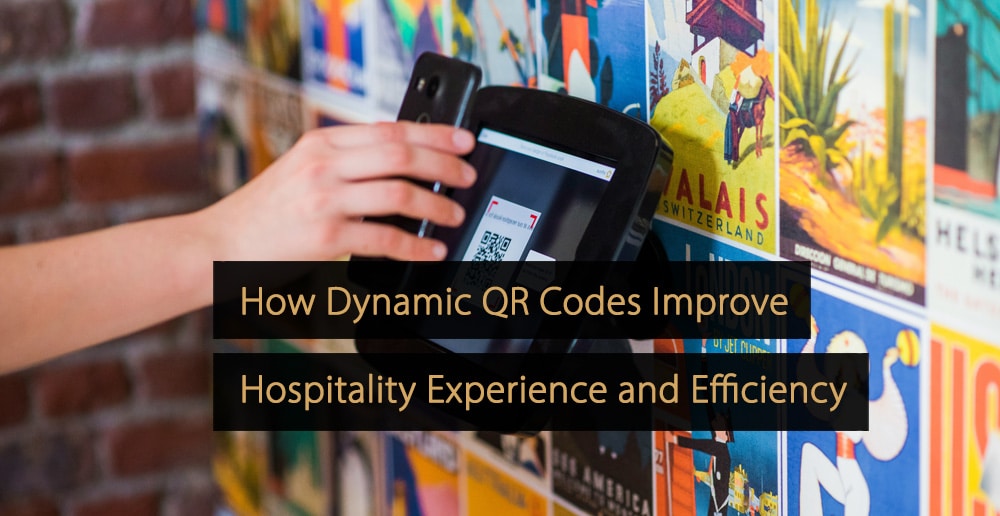In the internet age, with information freely available and customers able to compare hotels easily, those in the hospitality industry must keep up to date with the latest digital trends. Not only can this help you to keep pace with hotel industry rivals, but it can also improve processes and enhance the customer experience you deliver. In this article, you will find seven of the most important digital trends to focus on.
Table of Contents:
- 17 Digital Trends in the Hospitality Industry
- 1. Internet of Things (IoT)
- 2. Artificial Intelligence (AI) & Chatbots
- 3. Recognition Technology
- 4. Virtual Reality (VR)
- 5. Contactless Technology
- 6. Biometrics Technology
- 7. Digital Guest Experience
- 8. Big Data Analytics
- 9. Cloud Computing
- 10. Augmented Reality (AR)
- 11. Mobile Integration
- 12. Reputation Management
- 13. Robots
- 14. Exploring the Metaverse
- 15. Non-Fungible Tokens (NFTs) Enter the Hospitality Industry
- 16. Online Food Ordering Systems
- 17. WiFi 6
- Digital Trends in Related Industries
17 Digital Trends in the Hospitality Industry
Discover the 17 digital trends that are prevalent in the hospitality industry.
1. Internet of Things (IoT)
The Internet of Things refers to everyday devices fitted with Internet capabilities, allowing them to send and receive data. According to the Data Volume of IoT Connected Devices Worldwide by Statista, the total number of connected devices worldwide is projected to reach $75.44 billion by 2025. This technology is hugely important within the hospitality industry because it can allow hotels to save on energy costs while also optimizing hotel rooms without human interference.
Some hotels use smart energy systems to automatically reduce light bulbs’ power during daylight hours or to turn off the heating system when rooms are unoccupied or when occupied rooms reach a certain temperature. It can also be used to optimize temperatures automatically before guests arrive.
Example: The Internet of Things comes from the hotel network
In the article “How the Internet of Things (IoT) Can Benefit the Hospitality Industry“, find more detailed information about the Internet of Things’ in the hospitality industry.
2. Artificial Intelligence (AI) & Chatbots
Chatbots deliver artificially intelligent responses to customer questions and queries, and this is one of the most advantageous digital trends in the hospitality industry today. After all, it means simple questions can be answered without a human agent, improving response times and freeing human reps up to tackle tougher issues.
Artificial intelligence can also be used to automatically analyze data, assist with a revenue management strategy, or provide more personalized offers to customers based on their preferences. Hilton, meanwhile, has even introduced an artificially intelligent robot that can respond to human speech and answer questions.
Example: Hilton and IBM pilot “Connie”
Find more detailed information and examples about artificial intelligence use cases in the hospitality industry in the article “How to use Artificial Intelligence in the Hospitality Industry”.
3. Recognition Technology
Another digital trend within hospitality management is Recognition technology. Recognition technology includes everything from facial recognition to fingerprint or retina scanning and is growing in popularity in general. Its numerous uses within the hotel industry primarily revolve around speeding up payment processes and reducing the needed contact with human staff.
Technology like Face ID and Touch ID from Apple, as well as Amazon Go stores and widespread use of beacon technology, have opened up many people’s minds to the possibilities offered through frictionless automation. Moving forward, hotels are likely to use facial recognition for automatic authorization of payments after leaving the restaurant or to automate the check-out process, avoiding queues.
Example: Facial Recognition Check-in in Marriott China
In the article “Use Cases of Facial Recognition in The Hospitality Industry“, find more detailed information about how your business can benefit from facial recognition.
4. Virtual Reality (VR)
One of the coolest digital trends within the hospitality industry is virtual reality. Due to its ability to effectively transport people to a digitally created new environment, virtual reality offers huge potential within the hospitality industry. Many hotels are already using 360-degree video and other virtual reality technology during the booking process and beyond.
On hotel websites, some chains are using VR to allow people to experience what their hotel rooms are like before they book them, facilitating more informed decisions on the size of the room they need. Meanwhile, the technology can also be used to provide virtual experiences of local attractions or as a means of entertainment within hotels.
Example: Holiday Inn Express Adelaide 360 VR Hotel Tour
Find more detailed information and examples about how virtual reality can benefit your business in the articles “How Virtual Reality is Transforming the Travel Industry” and “Amazing Examples of Virtual Reality Hotel Tours”.
5. Contactless Technology
Contactless technology is a category of technology solutions that removes the need for physical interactions and direct contact. This includes contactless payment technology, scannable QR code,s and mobile check-ins.
This technology has emerged as one of the major digital trends in the hospitality industry because it can reduce friction at key touchpoints and improve convenience. Contactless technology also reduces staff workloads in many situations.
For example, contactless payments make it much faster and easier for customers to pay for goods and services, while mobile check-ins allow guests to check into a hotel without having to queue at the front desk.
In restaurants, scannable QR codes can be used to access the menu on a smartphone, reducing printing costs. This can also enable orders to be placed at any time, even if waiting staff are not available to take the order. Contactless ordering has additional benefits, like making it easier to request drinks and food items after the initial order is placed.
6. Biometrics Technology
Biometrics is an automated technology that identifies and recognizes individuals, based on unique characteristics. This includes fingerprint scanning, iris or retina scanning, facial recognition, palm prints and voice recognition.
This technology can be used to greatly enhance security and efficiency in hospitality businesses. These qualities have made it one of the most valuable digital trends in the hospitality industry today.
While concepts like Face ID and Touch ID have already been covered, it is worth noting that biometrics can be used to optimize operations behind the scenes. For instance, fingerprint or iris scanning can be used to automatically manage restricted areas of your premises, while facial recognition can be used to track staff attendance.
Biometrics technology also has a role to play in analytics, helping businesses to determine the number of people in a location at a given time, the areas of a business that attract the most footfall, or even people’s moods.
Video: China’s Alibaba opens ‘hotel of the future’ with automated check-in, biometrics and voice-control
7. Digital Guest Experience
The digital guest experience is a broad term, describing every digital interaction guests have with your hospitality business. It can include online bookings, using your mobile app, checking in digitally, and using other digital solutions.
As a concept, the guest experience is now one of the most important digital trends in the hospitality industry. It is an area where businesses can compete in terms of efficiency, convenience and the ‘wow factor‘.
In a modern hospitality business, digital interactions occur at every stage of the customer journey, from discovering your website, to checking out digitally and even leaving an online review after their visit.
You need to try to optimize your digital guest experience across every touchpoint, including social media, in-room technology in hotels, check-in technology, digital communication tools and contactless payments. At the same time, digital interactions should enhance the experience and never replace situations where a human touch is needed.
8. Big Data Analytics
Big data describes the collection of vast quantities of complex or diverse data sets. Data becomes ‘big data’ when the volume and structure becomes too big to be compatible with conventional data processing solutions.
Big data analytics is important because it allows hospitality businesses to understand the market, customer sentiment, and key performance trends. Analytics allows data to be interpreted and useful conclusions to be drawn.
One of the biggest data analytics and digital trends in the hospitality industry right now is artificial intelligence. AI can be especially useful for interpreting large amounts of data quickly, with minimal human involvement. This can be crucial for dealing with large amounts of customer communications data and social media sentiment.
Using high-quality big data analytics tools, hospitality businesses can make evidence-based decisions based on strategy, get a better sense of how customers feel, and deliver a more carefully tailored guest experience.
9. Cloud Computing
Cloud computing relies on a network of remote servers to store and process data. It effectively uses the internet for computing and can be deployed for everything from cloud-based software solutions, to cloud-based data backups.
The importance of cloud computing is difficult to overstate, as it prevents data from having a single point of failure and reduces the risks associated with data loss. Cloud technology also allows important tools to be accessed remotely.
In terms of its role in securing data, cloud backups are stored across a network of remote servers. This means data will be available to use in the event that on-site data is lost or accidentally deleted, or in the event that storage devices are damaged. Cloud data backups have emerged as an essential solution for business continuity.
Cloud technology is one of the biggest digital trends in the hospitality industry right now and has also given rise to software that can be accessed from anywhere in the world, on any device capable of connecting to the internet and using a web browser. This is especially useful in an age of remote and hybrid working.
10. Augmented Reality (AR)
Augmented reality is a digital trend that shares many similarities with virtual reality. Still, where VR entirely changes the user’s surroundings, AR enhances real-world surroundings, usually with graphical or informational overlays. Those within the hotel industry can use this to offer several advantages to customers.
For instance, imagine having a wall map in your hotel, which, combined with an AR app, allows customers to point their phones at a section of the map and see information about local attractions. Alternatively, some apps allow users to aim their phones at real restaurants in the local area and see customer reviews instantly.
Example: Augmented reality within the hospitality industry
Find more detailed information and examples about how augmented reality can benefit your business in the article “How Augmented Reality is Transforming the Hospitality Industry”.
11. Mobile Integration
Most customers own smartphones, and they are conditioned to be able to use them for everything from requesting an Uber to ordering food. Those in the hospitality industry need to cater for this. A dedicated hotel app can go a long way, allowing guests to reserve restaurant tables, order room service, and book massage or spa sessions.
While self-service can help improve the customer experience, apps can also create loyalty programs, generating more repeat business. Moreover, the technology can be paired with the aforementioned capabilities provided by the Internet of Things, allowing customers to control heating and lighting from the app too.
12. Reputation Management
Finally, in an age where around 65 percent of customers will check online reviews before booking a hotel, reputation management has emerged as one of the most important digital trends. There are several ways that those within the hotel industry can manage reviews, but it requires a long-term approach.
Respond to reviews on popular review platforms and acknowledge when guests have a genuine cause for complaint. Take action to address their complaints to avoid similar reviews in the future. It is also important to encourage happy guests to leave reviews, and this can be done at the check-out desk or via email. Keep your listings on online review platforms up-to-date, include reviews on your own website, and strive to deliver excellent customer service.
Example: 4 Reputation Management Challenges Every Hotel Manager Faces
The article “Tips to Manage Online Hotel Reviews“ provides more detailed information about managing online hotel reviews.
13. Robots
Until recently, the use of robots within workplaces has primarily been limited to manufacturing lines. However, within the hospitality sector, AI-driven robots, which more closely resemble humans, are one of the emerging digital trends. According to the Hospitality Robots Market Analysis by TechNavio, the hospitality robot market is forecasted to grow at a CAGR rate of 12.13% between 2022 and 2027. These robots can perform a range of complex, ‘intelligent’ tasks.
An exciting example to date is the Henn-na Hotel in Nagasaki. Dubbed ‘the world’s first robot staffed hotel’, it features an information robot, which provides tourist information, a front desk robot is capable of intelligent communication, a cloak robot that stores your belongings, and a face recognition system that will check you in and prevent losing your key.
Example: A Tour of the World’s First Robot-Staffed Hotel
In the article “Examples of Robots Being Used in the Hospitality Industry“, find more detailed information and examples about robot use cases in the hospitality industry.
14. Exploring the Metaverse
Aside from the aforementioned digital trends hospitality companies need to keep up with, it is also becoming increasingly important for businesses to prepare for and invest in metaverse technology. This describes 3D metaverse virtual words, where users socially interact, often powered by VR, AR, blockchain technology, and digital avatars.
To learn more about the metaverse, how it works, the various ways hospitality businesses are already utilizing this technology and the exciting opportunities that are likely to exist, read the “Metaverse Opportunities for the Hospitality Industry” article.
15. Non-Fungible Tokens (NFTs) Enter the Hospitality Industry
Non-fungible tokens, or NFTs for short, are another of the major digital trends hospitality industry businesses are exploring, and while this technology is only just entering this particular space, it is already showing promise in terms of marketing campaigns and providing the foundation for customer loyalty programs.
In the article “Why NFT Technology is the Next Marketing Trend in the Hospitality Industry“, you can learn about NFTs, how they work, why they are valuable, and how they are used in hospitality.
16. Online Food Ordering Systems
Online food ordering systems are among the major digital trends hospitality industry businesses are experimenting with. Such a system allows restaurants and similar businesses to expand their offering beyond their own premises, providing food delivery and food collection services for customers who may not want the traditional dining experience.
In the “Online Food Ordering System: Must-Have Features When Choosing One” guide, you can learn more about how these systems work and explore the most essential features to look out for.
Table: Food Ordering System Features & Descriptions
17. WiFi 6
Regarding key digital trends in the hospitality industry, WiFi 6 needs to be highlighted. This represents the next generation of WiFi technology, significantly boosting throughput and internet speeds, which can be vital for improving the guest experience and making life easier for employees.
The improved speeds provided by WiFi 6 can be invaluable for modern hospitality businesses, which are likely to have multiple ‘smart’ devices, including smart TVs, smartphones, computers, tablets, and smart speakers, which all require access to the internet and the ability to send and receive data quickly.
By understanding and embracing the digital trends in this article, you can stay competitive in the hospitality industry and even gain an advantage over some of your competitors. All the trends mentioned can help improve the customer experience, enhance your reputation for customer service, and/or optimize revenue generation.
Did You Like This Article About Digital Trends in the Hospitality Industry?
You might also be interested in the following articles about digital trends in related industries:
- Key Digital Trends in the Travel Industry
- Hot Digital Trends in the Hotel Industry
- The Latest Technology Trends in the Hospitality Industry
- Hot Digital Trends in the Tourism Industry
- Key Technology Trends Emerging in the Travel Industry
More Tips to Grow Your Business
Revfine.com is the leading knowledge platform for the hospitality and travel industry. Professionals use our insights, strategies, and actionable tips to get inspired, optimize revenue, innovate processes, and improve customer experience.Explore expert advice on management, marketing, revenue management, operations, software, and technology in our dedicated Hotel, Hospitality, and Travel & Tourism categories.
This article is written by:
Hi, I am Martijn Barten, founder of Revfine.com. With 20 years of experience in the hospitality industry, I specialize in optimizing revenue by combining revenue management with marketing strategies. I have successfully developed, implemented, and managed revenue management and marketing strategies for individual properties and multi-property portfolios.










Great content! Very well organised. Love the video alternating each section. Brilliant!
Thank you a lot for sharing all digital hospitality trends, It’s very helpful